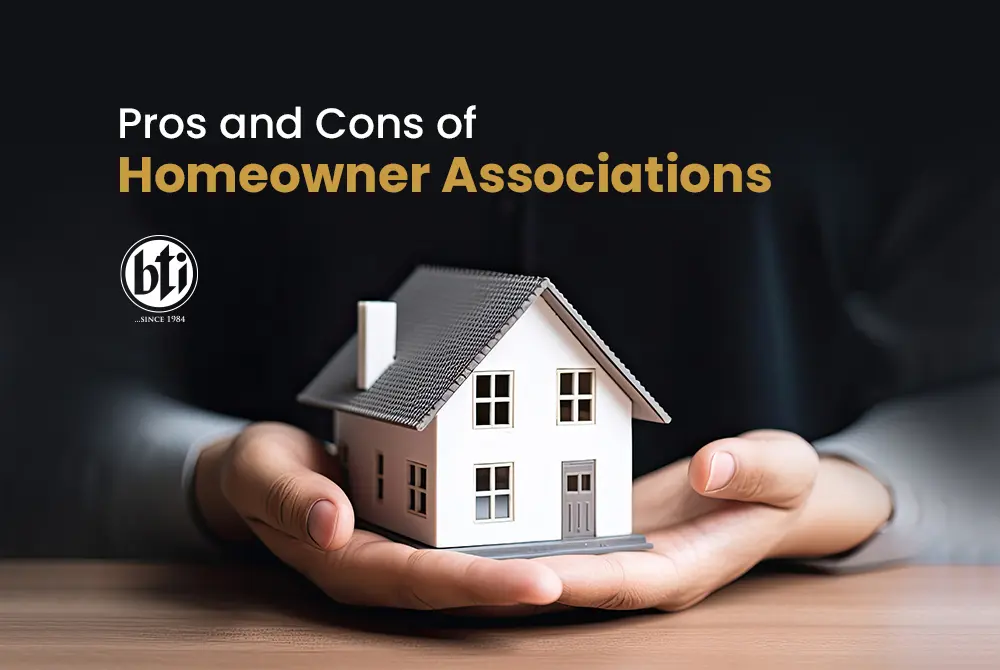
Homeowner Associations (HOAs) are now prevalent in residential communities worldwide. They are responsible for setting rules, overseeing shared spaces, and collecting dues from residents to uphold the community’s standards and facilities. Despite the advantages they provide, HOAs also have disadvantages. This article will delve into the advantages and disadvantages of homeowner associations to assist you in making a well-informed choice about residing in an HOA-managed neighborhood.
Pros of Homeowner Associations
Community Amenities: Homeowner associations often provide access to amenities such as swimming pools, fitness centers, parks, and community centers. These facilities can enhance residents’ quality of life and contribute to a sense of community.
Property Maintenance: HOAs are responsible for managing the upkeep of shared spaces within a community, such as gardens, pathways, and street lamps. This ensures that the neighborhood maintains its appeal and attractiveness, ultimately contributing to the long-term preservation of property values.
Enforcement of Rules: They are responsible for creating and implementing guidelines that cover property upkeep, architectural guidelines, and noise restrictions. These regulations are put in place to uphold a unified appearance and tranquil environment throughout the neighborhood.
Dispute Resolution: In case of conflicts arising between homeowners or violations of HOA rules, the association can facilitate dispute resolution procedures to address concerns and uphold harmony within the community.
Collective Bargaining Power: HOAs possess the capacity to engage in negotiations for bulk discounts on various services, including landscaping, trash collection, and insurance coverage. As a result, homeowners can enjoy cost savings when compared to making individual arrangements.
Cons of Homeowner Associations
Fees and Assessments: Homeowners are required to make monthly or yearly payments for HOA fees, which are intended to cover the expenses associated with the upkeep of shared spaces and facilities. Moreover, in order to address unforeseen costs or make necessary enhancements, there might be instances where additional charges, known as special assessments, are imposed, thereby adding to the financial responsibilities of the residents.
Lack of Autonomy: Residing in a community managed by an HOA entails giving up a certain level of independence when it comes to property-related choices. Residents are required to follow the rules and regulations set by the HOA, which could limit things like making changes to the exterior of the home, organizing parking spaces, and owning pets.
Potential for Conflict: Conflicts may arise within the HOA due to divergent opinions and priorities among homeowners, especially when it comes to enforcing rules, allocating budgets, and making significant decisions that impact the community. In order to resolve these conflicts, all parties involved must be willing to invest time and effort and engage in compromise.
Limited Flexibility: Homeowners may find their ability to customize their properties or alter their homes limited by the rules and regulations set by the HOA. Some residents may view restrictions on exterior changes, paint colors, and landscaping options as overly controlling.
Management Issues: The efficiency of HOA management may differ significantly based on the skill and professionalism of the board members and property management company. Ineffective management methods, a lack of transparency, and breakdowns in communication can lead to homeowner dissatisfaction.
When contemplating the idea of residing in a community managed by a Homeowner Association (HOA), it is crucial to carefully consider the advantages and disadvantages and determine if the benefits align with your personal preferences and priorities as a homeowner. Furthermore, it is important to thoroughly examine the HOA’s governing documents, financial statements, and regulations before reaching a decision, ensuring that you have a comprehensive understanding of the responsibilities and limitations associated with membership.
Ultimately, whether or not an HOA is suitable for you depends on your unique lifestyle preferences, financial circumstances, and willingness to embrace communal living. By conducting thorough research and thoughtfully evaluating your options, you can make an educated decision that caters to your needs and enhances your overall homeownership experience.